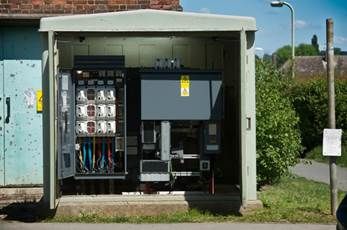DEDUCE Project Update
The Deduce project (Determining Electricity Usage with Consumer Electronics) was registered in October 2017. The aim of this project is to investigate the potential for very low cost distribution substation monitoring (sub £100) through the use of indirect measurement and consumer electronics.
By measuring parameters such as temperature, vibration or noise, loading could be inferred without the need for more costly sensors. Indirect measurement will also allow for the use of existing, potentially cheaper, sensor packages. 
Picture caption: An example of a typical distribution substation.
The monitoring devices should be capable of providing general loading profiles of substations and allow the roll out of full monitoring to be more targeted. By reducing the requirements for full monitoring, low cost monitoring can provide a financial benefit to DNOs and the wider customer by providing more information on substation loading, as well as allowing the targeting of more accurate measurement systems. The project will have two main strands of research:
- Investigation and testing of potential sensors and packaging by Loughborough University. This will focus on low cost sensors and existing measurement devices (such as smart phones); and
- A UK wide university competition, supported by Loughborough University, aimed at engaging students in energy innovation by exploring non-traditional solutions and giving students a chance to create something that will be trialled on the network. This includes a top prize of up to £5000 going to the highest scored project.
The successful sensors will be built and tested in a laboratory at Loughborough University with possible testing on University owner LV facilities where appropriate.
The project is expected to run over 10 months; learning will then be shared with other network licensees.
The student competition closed on 16th February, we had 5 proposals submitted to us and all proposals were considered. Initial investigations into the various options were conducted with a selection of sensors for testing identified. Three proposals were chosen to progress to the next stage and these successful participants have been informed. There are some interesting concepts being looked into, which may be able to provide valuable learning to the wider design of low cost sensors.
The test facility has been commissioned ready for testing of sensors. Current testing is focusing on android based smart phone sensors and results are encouraging. Further updates will be expected at the end of July 2018.
To find out more about the project, click here
- Innovation
